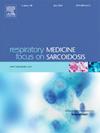睡眠磨牙症患者的呼吸功能受损:一项对照横断面研究
IF 3.1
3区 医学
Q2 CARDIAC & CARDIOVASCULAR SYSTEMS
引用次数: 0
摘要
越来越多的证据表明,睡眠磨牙症(SB)被认为是一种多方面的疾病,可能具有全身性影响,包括对呼吸功能、运动能力和其他身体系统的影响,可能会降低整体生活质量(QOL)。本研究旨在探讨SB患者与健康对照者的呼吸功能、呼吸肌性能、功能容量和生活质量。材料与方法本研究包括47例疑似SB患者和21例健康对照。SB的分类基于自我报告和/或伴侣确认的与睡眠相关的咀嚼肌活动(2018年磨牙症国际共识标准)。通过肺活量测定法评估呼吸功能,使用最大吸气和呼气压力测量呼吸肌力量,以及使用增量阈值负荷试验评估呼吸耐力。使用6分钟步行测验(6MWT)评估功能能力,使用Short Form-36问卷测量生活质量。结果与健康对照组相比,SB患者呼气流量峰值明显降低(p <;0.001),最大吸气和呼气压(p <;0.001),呼吸肌耐力(p <;0.001)。他们还表现出在6MWT期间步行距离减少和预测百分比值降低(p <;0.05)。此外,在身体功能、活力、情绪健康和一般健康方面,生活质量得分明显较低(p <;0.05)。结论SB可能与呼吸肌功能下降、功能能力下降和生活质量降低有关。这些发现强调了在SB的临床管理中考虑系统评估,特别是呼吸和身体功能评估的重要性。本文章由计算机程序翻译,如有差异,请以英文原文为准。

Impaired respiratory and functional capacity in individuals with sleep BRUXISM: A controlled cross-sectional study
Background
Growing evidence indicates that Sleep bruxism (SB) is recognized as a multifaceted condition that potentially has systemic implications, including effects on respiratory functions, exercise capacity, and possibly other body systems, which may reduce overall quality of life (QOL). This study aimed to investigate respiratory functions, respiratory muscle performance, functional capacity, and QOL in individuals with SB compared to healthy controls.
Materials and methods
This study included 47 individuals with probable SB and 21 healthy controls. The classification of SB was based on self-reported and/or partner-confirmed sleep-related masticatory muscle activity (2018 international consensus criteria on bruxism). Respiratory functions were assessed via spirometry, respiratory muscle strength using maximal inspiratory and expiratory pressure measurements, and respiratory endurance with an incremental threshold loading test. Functional capacity was evaluated using the 6-min walk test (6MWT), and QOL was measured using the Short Form-36 questionnaire.
Results
Compared to healthy controls, individuals with SB showed significantly lower peak expiratory flow (p < 0.001), maximal inspiratory and expiratory pressures (p < 0.001), and respiratory muscle endurance (p < 0.001). They also demonstrated reduced walking distance during the 6MWT and lower predicted percentage values (p < 0.05). Additionally, QOL scores were significantly lower in physical functioning, vitality, emotional wellbeing, and general health (p < 0.05).
Conclusion
This study highlights that probable SB may be associated with reduced respiratory muscle performance, diminished functional capacity, and lower QOL. These findings emphasize the importance of considering systemic evaluations, particularly of respiratory and physical function, in the clinical management of SB.
求助全文
通过发布文献求助,成功后即可免费获取论文全文。
去求助
来源期刊

Respiratory medicine
医学-呼吸系统
CiteScore
7.50
自引率
0.00%
发文量
199
审稿时长
38 days
期刊介绍:
Respiratory Medicine is an internationally-renowned journal devoted to the rapid publication of clinically-relevant respiratory medicine research. It combines cutting-edge original research with state-of-the-art reviews dealing with all aspects of respiratory diseases and therapeutic interventions. Topics include adult and paediatric medicine, epidemiology, immunology and cell biology, physiology, occupational disorders, and the role of allergens and pollutants.
Respiratory Medicine is increasingly the journal of choice for publication of phased trial work, commenting on effectiveness, dosage and methods of action.
 求助内容:
求助内容: 应助结果提醒方式:
应助结果提醒方式:


